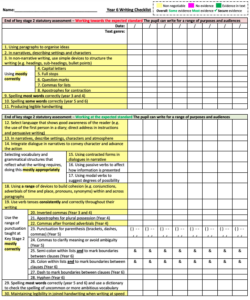The Pros and Cons of Using Age-Related Expectations in UK Schools
As a UK teacher, you will probably be familiar with ‘age related expectations‘ (AREs) when assessing students’ progress. In this blog post, we’ll explore the pros and cons of using AREs with the national curriculum, and consider alternative assessment methods that can help provide a holistic approach to supporting students.

Age-Related Expectations and their Importance in Primary School Education
Age-related expectations are a crucial part of primary school education, as they help to measure and determine a child’s progress in different subjects throughout the school year.
In assessments, expected standards are used involving a scaled score system. Test scores, alongside teacher’s own assessments, form the basis of each end-of-year report before they are used to inform parents. Age related expectations are used to assess the knowledge of each child across the key areas: english writing, english reading, maths, and science.
The national curriculum sets out a series of guidelines for each year group, which are then used by the school’s department to put together appropriate lesson objectives, and related homework, tests, and exams. The SATs years (occurring in Year 2 and Year 6) are particularly important, as these tests are used to determine whether a child is meeting the national standard for their age group.
AREs are also applied in non-SATs years, to ensure higher standards are set for each child, based on the context of their year group and subject. By explaining these expectations clearly to students and parents, and providing regular updates on progress against the national average, primary schools can help children achieve their full potential and develop important skills for future education.
Pros of Using Age-Related Expectations:
Setting Clear Expectations
AREs are used to set clear expectations for what students of a certain age (and key stage) should be able to achieve academically. These expectations help teachers to identify areas where students need further support and resources to help them achieve their potential.
See the example below of age related expectations for a key stage two pupil’s writing. The teacher assessments are broken down into age related expectation statements (of performance descriptors).

Standardisation using the new national curriculum
Using AREs helps to standardise the educational experience across the country. This ensures that students are achieving at a similar level, regardless of their location.
It enables teachers to be able to work effectively in schools UK-wide to get students to meet age related expectations.
Possible Cons of Using Age Related Expectations:
One of the main difficulties with using AREs is that children develop at different rates, even if they are exactly the same age. This can lead to some students being assessed as not meeting the expectations for their age, even if they are making progress at their own pace.
Also, in any typical classroom, pupils can be up to 11 months apart in age. This means the expectations set can be problematic, especially in the younger year groups.
Discouragement of Self-Assessment
AREs may not be effective for students’ self-assessments. The learning objectives are often written in language that the vast majority of children would find it difficult to decipher.
Additionally, students who consistently perform below the expected level may begin to feel discouraged, even if they are making steady progress. This can be detrimental to their self-esteem and motivation to learn.
Alternative Assessment Methods:
Holistic Assessment
Using a variety of assessment methods, such as observations, teacher assessment, conversations with students, and work samples can provide a more holistic view of student’s progress and identify areas where they need further support. Curriculum content can be adapted to suit children. This method suits the adaptive teaching approach.
Individualised Targets
Setting individual targets that are tailored to student’s abilities, interests, and understanding can be more motivating than simply comparing them to age-related expectations.
While AREs can be very useful in assessing students’ skills, they should not be the only form of assessment used in primary schools. Experienced teachers should use a range of assessment methods, taking into account students’ individual differences and developmental progress. By doing so, teachers can provide targeted support and help all pupils achieve their potential.
Thank you for reading our post on age related expectations! If you are on the lookout for a new role, you can view all our latest school vacancies here.
Our specialist consultants are always happy to help you on their career journey – register and we’ll get in touch with you. In the meantime, why not try our free CPD-accredited training courses?
Teaching Blog
No results found.....